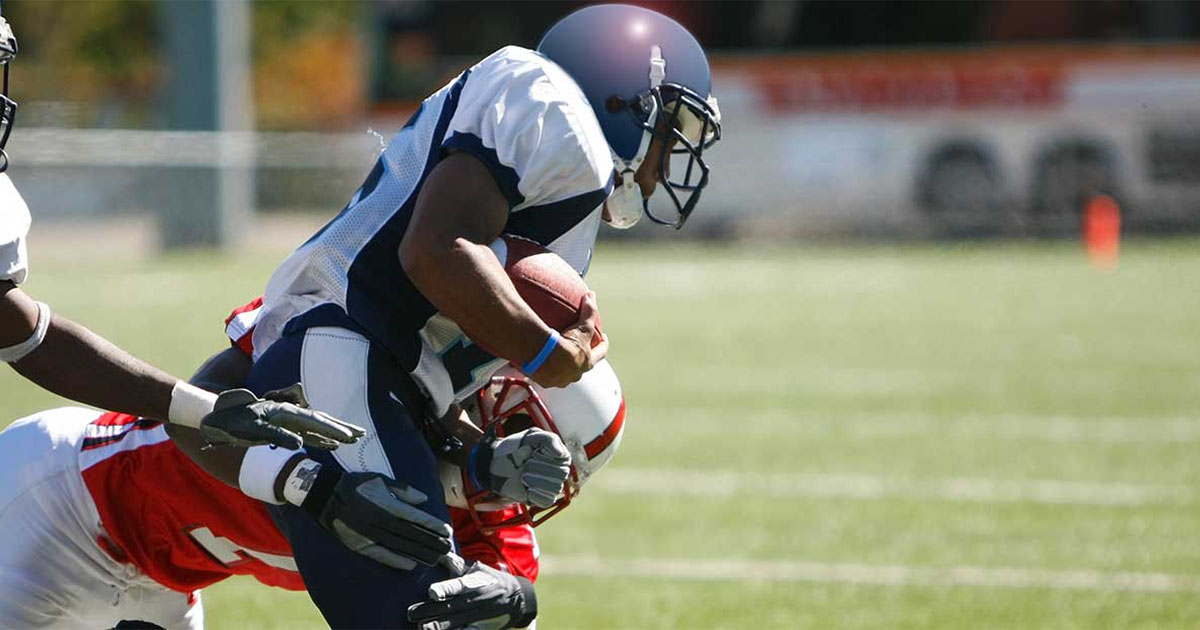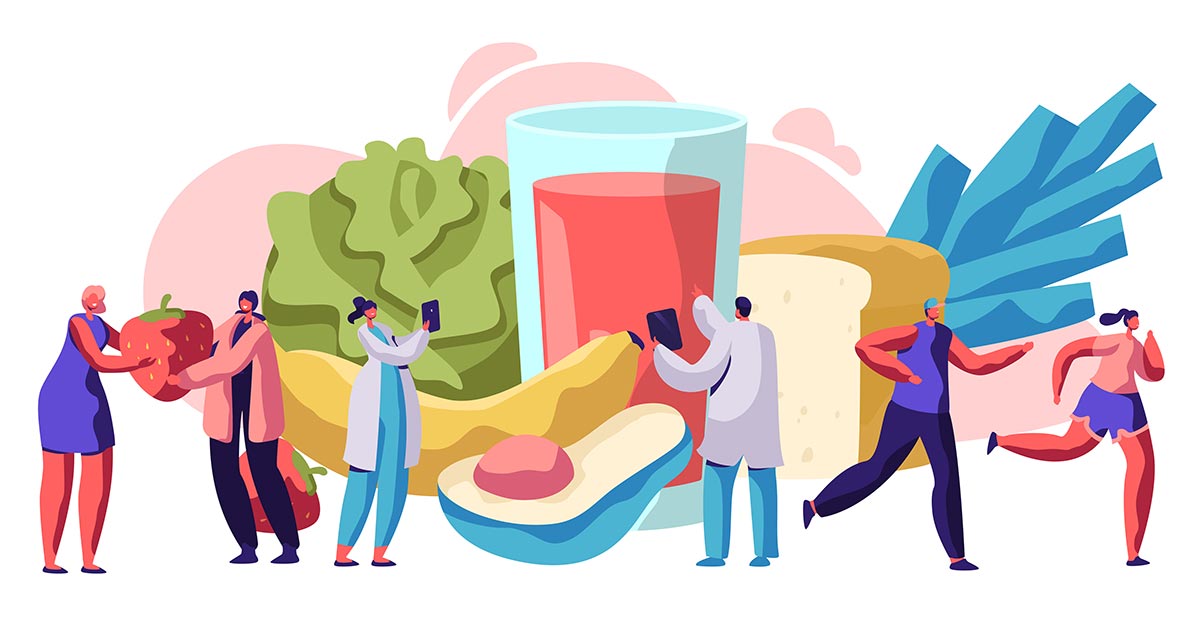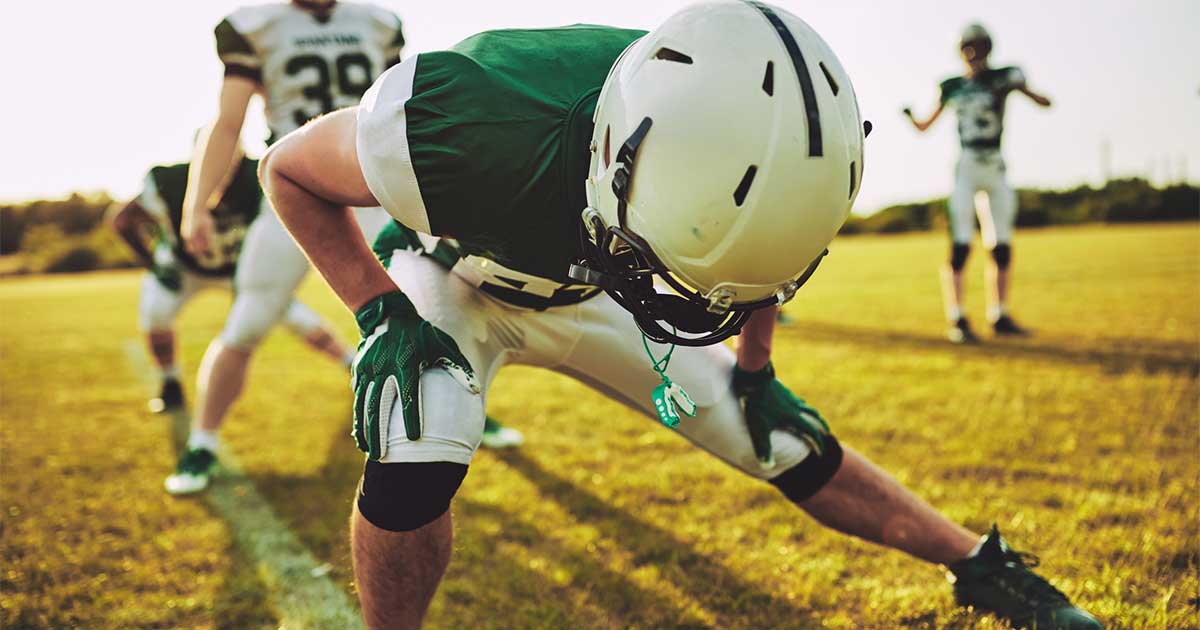A Guide to Proper Nutrition for Football Players
Advice to improve your movement, fitness, and overall health from the world's #1 in orthopedics.
Nutritional needs vary based not only on the individual but also on the position they play. Nutrition plans must be individualized for each player based on their weight, height, body fat percentage, and position on the field. One thing all plans have in common is consistency, says Jason Machowsky, RD, CSSD, ACSM-CEP, CSCS, a sports dietitian and exercise physiologist at HSS. "Choosing nutritious foods and eating them in the right amounts as training demands fluctuate over the year is key," he adds.

Carbohydrates
Athletes need plenty of carbs. Football players rely heavily on glycogen stores for energy. Carbohydrates are the go-to source of energy for intermittent sports, like football, where glycogen stores are often depleted during long workouts and training, says Machowsky. The amount required and how often to consume it will vary based on the time of year (such as off-season, pre-season, etc.), the player’s specific goals, and their position.
Choosing a variety of whole grain breads, pasta, rice, potatoes, fruits and vegetables ensures players are getting not only the carbs necessary to perform but also essential vitamins, minerals and fiber, which have a slew of important functions. In particular, these help to decrease inflammation and support recovery. Carbohydrates in the form of sports drinks, gels and similar products should generally be limited to game day and practice fueling, not part of a player's day-to-day eating routine, says Machowsky.
Refined carbohydrates, including white bread, cakes, candy, cookies, pies, high-sugar cereals, sodas, and juices, should be consumed sparingly, he adds.
Examples of Nutritious Carbs for Football Players
- Whole grains: oatmeal, 100% whole wheat bread, whole wheat or corn tortillas, whole wheat pasta, brown rice, and low sugar cereals containing at least 5g of protein per serving
- Fruit: fresh whole fruit including apples, pears, bananas, melon, pineapple, cantaloupe
- Non-starchy vegetables: broccoli, spinach, peppers, zucchini, lettuce greens (the darker the better), squash, onions, cauliflower, mushrooms, tomatoes, carrots
- Starchy vegetables: potatoes, sweet potatoes, peas, corn, butternut squash
- Beans and legumes: kidney beans, black beans, white beans, lentils
- Dairy: Greek yogurt, low-fat milk and chocolate milk
Proteins
Players need enough protein to stimulate muscle protein synthesis (build muscle), and also to repair muscle damage that occurs during training. Choosing lean, high-quality protein at meals, but also before and after every workout, is imperative, says Machowsky.
It’s a common misconception that athletes need to consume extra protein through shakes, bars and powders. Research shows that consumption of excessive amounts of protein offers no benefit to stimulating muscle protein synthesis and will more often displace other important nutrients your body needs. "Most times, it’s possible to meet a football player’s protein needs through real food," he adds. This requires a diet that includes high-quality sources of protein spread throughout the day among properly timed meals and snacks. "Large amounts of protein at one meal or a specific time may not be as well utilized," says Machowsky.
Chicken or turkey, lean red meats, beans, dairy, eggs and fish are all good options. Branched chain amino acids, or BCAAs, which are often touted in supplements, are readily found in dairy and meat.
Protein supplements can be useful if it becomes difficult to get in the amount of protein needed during the day, or for game day and practice fueling. "A great option is to make your own smoothies, if you have the means, with real foods like Greek yogurt, milk, nut butters and fruits like berries, apples or bananas," says Machowsky.
Anti-inflammatory Fats
Football players also need fat, but the nutritious kind. Too much fat (usually hydrogenated and saturated) can lead to increased risk of heart disease and excess calorie intake that can lead to undated weight gain, says Machowsky. Too little fat can affect nutrient absorption and ultimately impact performance as well, so moderation is the name of the game here. Not only is fat calorie dense, meaning a little goes a long way, but it’ll keep players satisfied meal to meal. Include 1 to 2 servings of fat in meals in the form of fatty fish, nuts and nut butters, seeds, meat, dairy, avocado and olive oil.
Focus on these fats and fat sources
- Monounsaturated fats:
- Olives and olive oil, avocado
- Sunflower seeds and nuts (pistachios, macadamia, almonds, cashews)
- Omega-3 Fatty Acids (polyunsaturated fats):
- Fatty fish (salmon, tuna, halibut, trout)
- Walnuts, flax and chia seeds
Limit these fats
- Full fat dairy, including butter
- palm oil, margarine and anything containing partially hydrogenated oil
- fried foods
- fatty cuts of beef, pork and chicken
- fried foods
- very creamy foods (creamy salad dressings and mayonnaise)
Don’t forget to snack
Snacking on real food about 2 to 3 times per day keeps players satisfied and adequately fueled between meals. Optimizing performance means players need some serious nutrient bang for their calorie buck and whole foods win the nutrient density competition every time.
If you want to play at the top of your game, reduce the junk food. Remember that food is functional, and it serves a purpose. When that purpose is helping players recover after two-a-days, that food needs to be filled with as much high-quality nutrition as possible.
Think whole fruit such as apples and bananas with ¾ cup low-fat cottage cheese or yogurt, a handful of nuts or 2 tablespoons of nut butter on a piece of whole grain toast, lettuce roll-ups with turkey, avocado and mustard, a protein shake or smoothie made with plain Greek yogurt, fruit and 1 to 2 tablespoons of almond butter, for example, or pop a few turkey meatballs (a common player favorite).
Hydration
"Dehydration is a medical condition that football players should take seriously, especially during the preseason and beginning of the season, when temperatures are high and they're training hard while wearing lots of heavy pads and gear," says Machowsky. Beware of symptoms like unusual shortness of breath, loss of coordination, racing pulse (even during a break), significant cramping, headache, nausea or vomiting and dizziness. If untreated, severe dehydration can be life threatening.
First, players should drink at least one standard bottle of water within an hour or two prior to practice or competition. During practice or a game, players should aim for at least 16 to 20 ounces of fluid per hour and should be drinking something every 15 to 20 minutes or so. Heavy sweaters may need more, up to one liter (32 ounces) per hour.
Players need to consider added electrolytes for activities lasting more than 60 to 75 minutes, especially if they are salty sweaters. (If you have white streaks on your clothing after your sweat dries, that applies to you.) Examples of sources of electrolytes include sports drinks, electrolyte powders or tablets added to water, or salty snacks like pretzels or crackers.



